Pelican SRVL1/SRVL2 Pros & Cons
Pros
- Customizable design
- Beginner friendly
- Organized contents
- Easy to order refills
Cons
- SRVL1 strap connectors are plastic and can break
- Backpack may be too heavy for smaller people
- Large upfront cost
The Bottom Line
The Pelican SRVL1 & SRVL2 are go bags perfect for the novice prepper who doesn't want to build their own kit and instead wants the ease of everything arriving ready to go.
Let’s be honest, we all want to be better prepared, but sometimes we just don’t have the time, energy, or resources to know how to better prep ourselves and loved ones for disasters or emergencies.
Pelican is best known for sturdy cases perfect for transporting guns, and it is looking to help with that. Recently, the company has jumped into the survival space, offering go bags for those who want an all-in-one, ready-to-go option with no muss, no fuss.
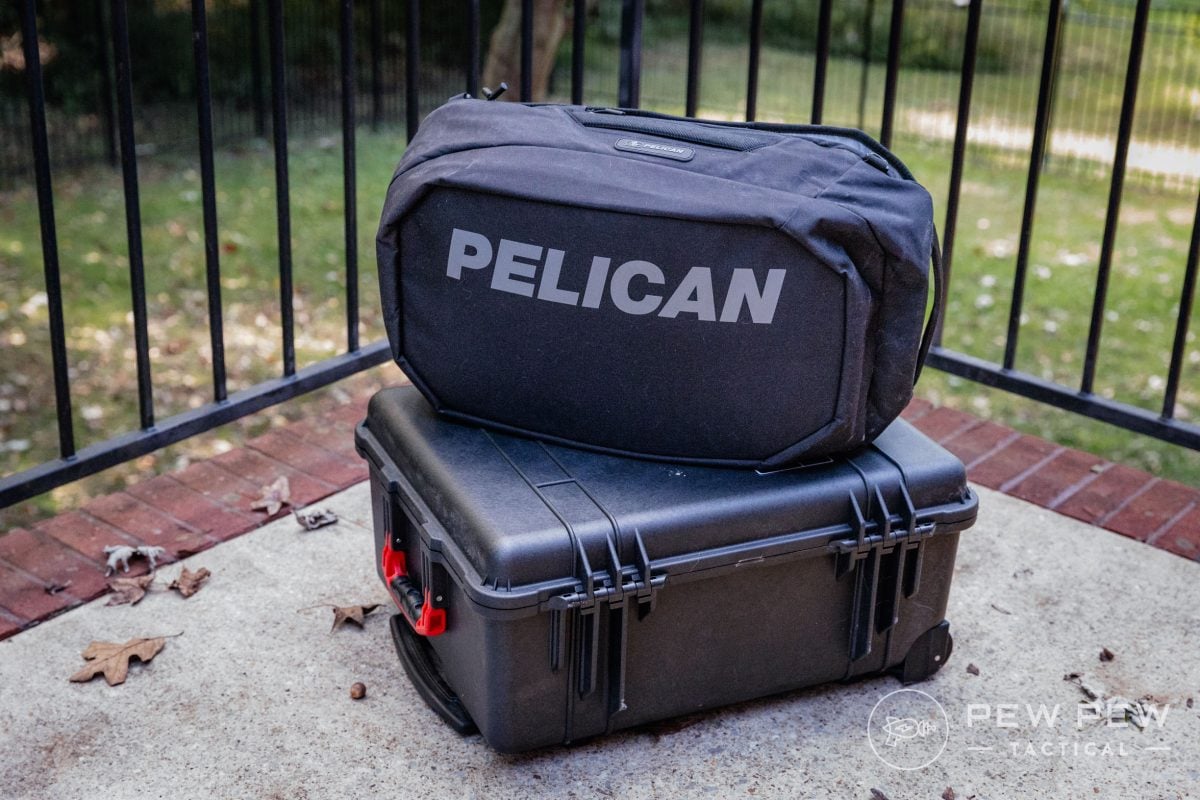
As someone interested in prepping and survival, I wanted to put these bags to the test, so I had Pelican send me their SRVL1 and SRVL2 Go Bags to take a closer look at whether these really offer value to you.
Table of Contents
Loading…
Pelican SRVL1 & SRVL2 Comparison Chart
| Pelican SRVL1 | Pelican SRVL2 | |
| Exterior Dimensions | 14.4” x 9.65” x 22.7” | 22.1″ x 10.9″ x 18.4″ |
| Interior Dimensions | 45L | 19.92″ x 9″ x 14.98″ |
| Weight | 15-18 lbs | 35-55 lbs |
| Price | $299 | $499 |
Prices accurate at time of writing
Prices accurate at time of writing
-
25% off all OAKLEY products - OAKLEY25
Copied! Visit Merchant
Prices accurate at time of writing
Prices accurate at time of writing
-
25% off all OAKLEY products - OAKLEY25
Copied! Visit Merchant
What Is a Go Bag?
Before we dive into the Pelican bags, let’s talk about the purpose of go bags.
A go bag is an emergency kit that is pre-packed and contains essential items required to survive for at least 72 hours should you be caught in an emergency or disaster-related situation.
They are designed to be mobile – grab and go!
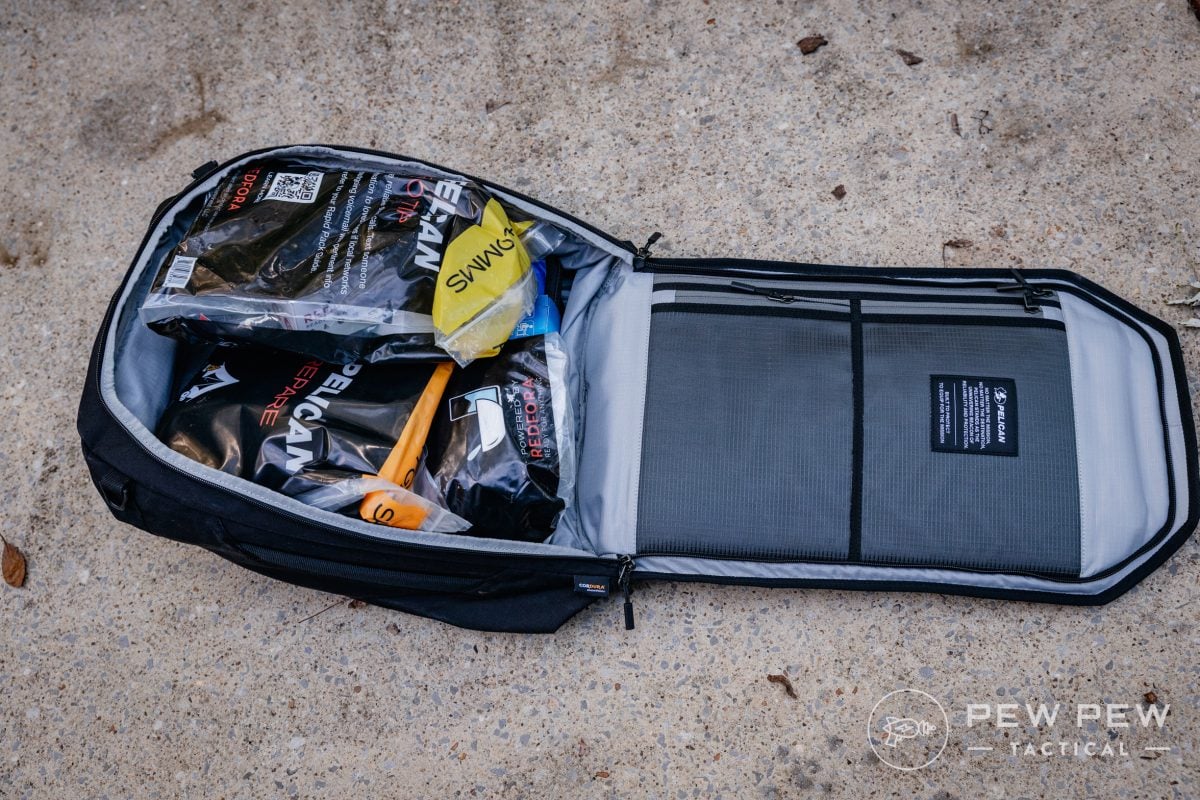
Items commonly found in go bags include:
- Water
- Food
- First Aid
- Medications
- Important Documents (birth certificates, marriage certificates, passports, etc.)
- Pet Supplies
- Baby Supplies
- Communication Tools
- Temporary Shelter Items
While some people prefer to source their own gear and build a personalized go bag, Pelican now offers an option for people who don’t want the hassle of building a go bag themselves.
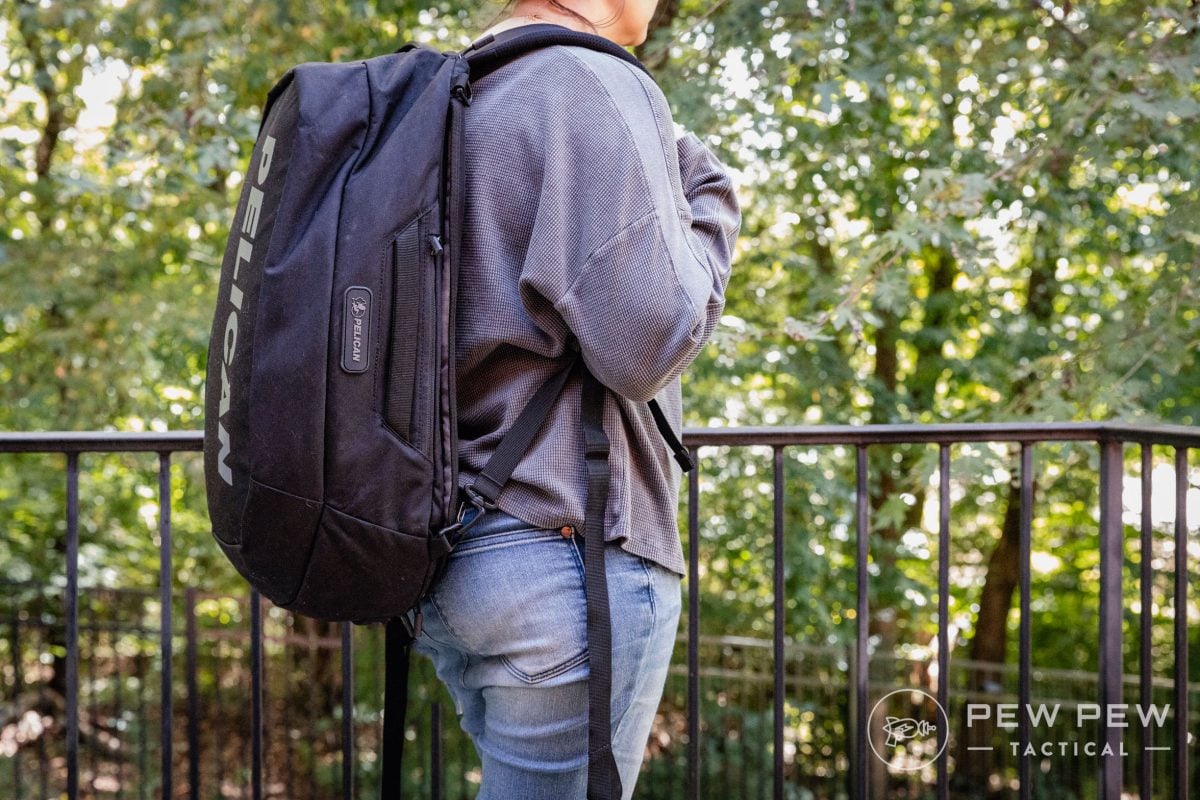
The SRVL1 is a 1-person bag that can be used as either a traditional backpack or converted to a shoulder or sling bag by swapping to the included strap.
Pelican’s SRVL2 is a 2-person setup encased in a hard-sided Pelican case on wheels with an extendable handle for easy rolling.
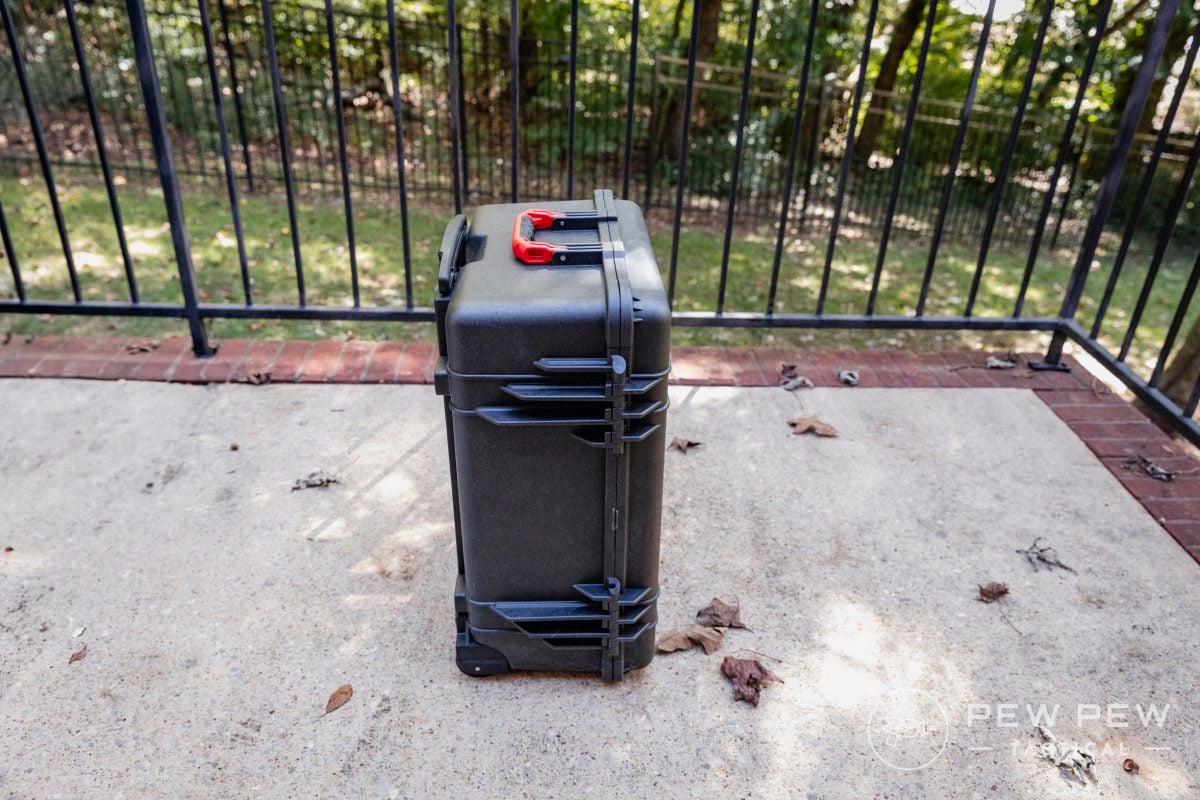
What’s Inside: Contents of the Pelican Go Bags
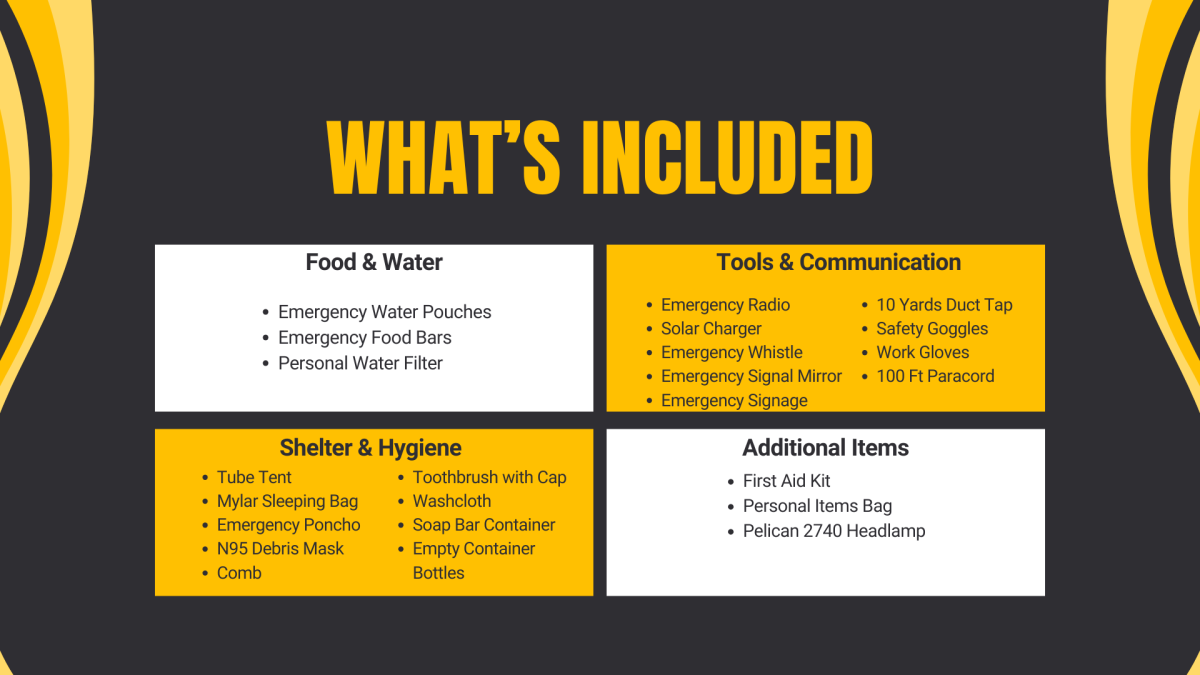
Pelican partnered with Redfora to stock the bags with certified emergency supplies that will get you through 72 hours.
Both bags feature the exact same products, but the SRVL2 is made for two people, so everything is doubled.
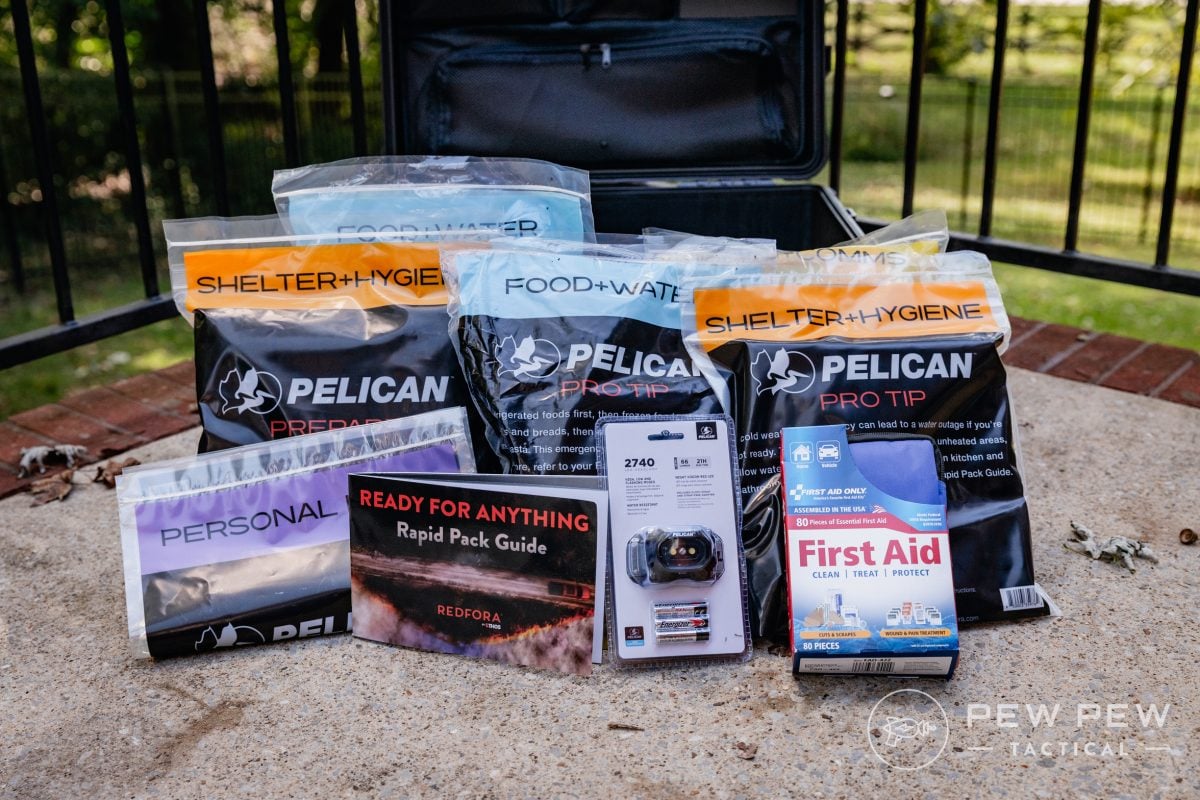
Most everything comes in plastic pouches that are clearly labeled to give you an idea of the contents – Food & Water, Tools & Communication, Shelter & Hygiene, and Personal Items. There are a few stragglers with no official home. Those include a fully stocked first aid kit, a Pelican 2740 headlamp, and a booklet.
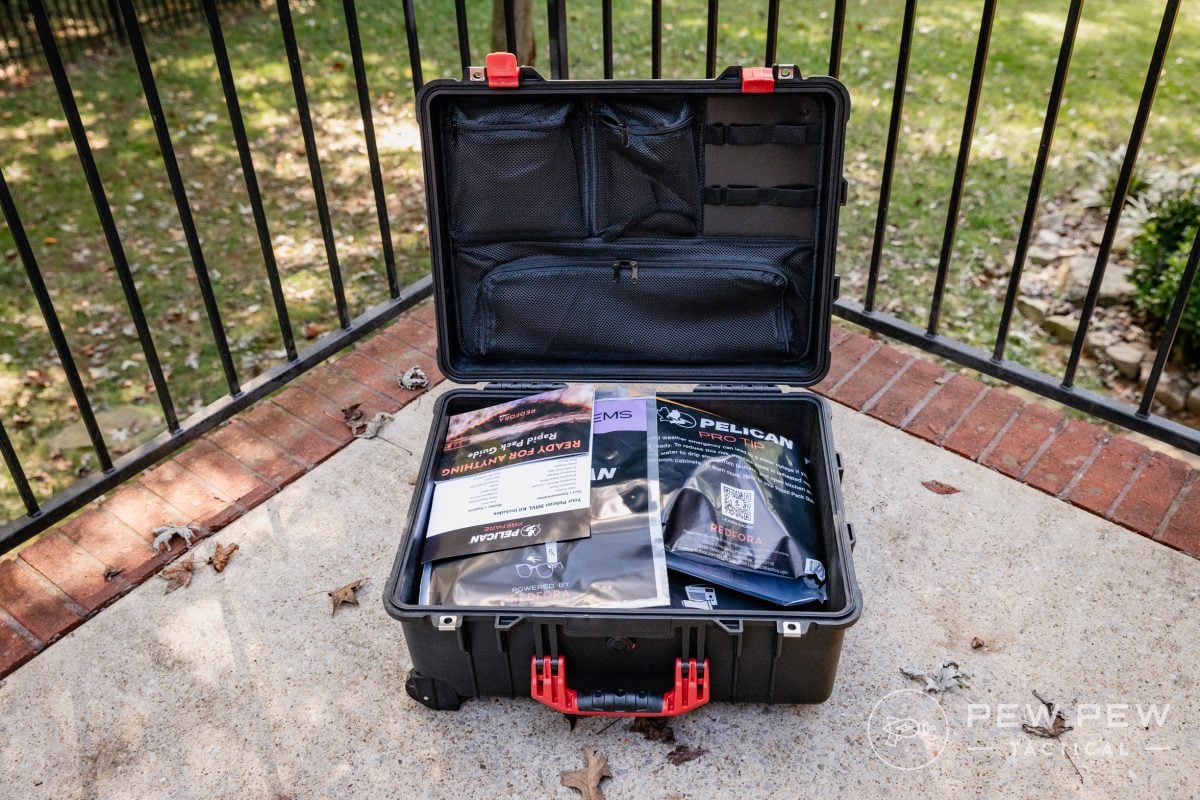
So, let’s discuss what’s inside…
Food & Water
When survival is on the table, your top priority is going to be food and water. The Pelican go bags come with a pouch that covers these needs.
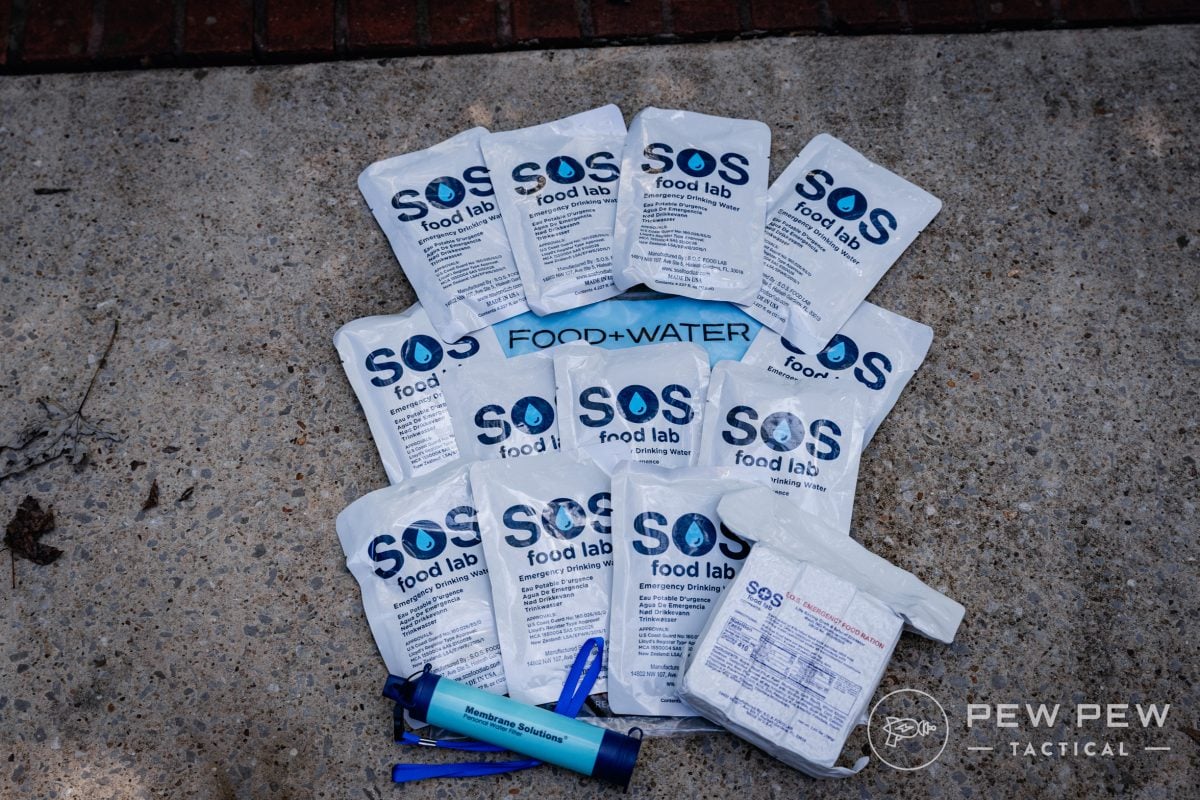
First up, food…
S.O.S. provides nutrients with emergency food rations. The packet offers nine individually wrapped fortified food blocks, totaling 410 calories each. The packaging is tough to open, so I would suggest scissors or a knife to get into it; otherwise, you’ll be struggling for a while (especially if you have longer nails). The food doesn’t taste bad – it’s actually good. It’s labeled as a cookie and definitely tastes like that.
I really like that S.O.S. clearly labels the date of manufacture, lot number, and expiration date. I’ve tried survival foods before, and sometimes those bits of information aren’t always clear. Knowing exactly when I need to restock is a big plus in my eyes.
Next, water…
The kit includes emergency water packets and a personal water filter.
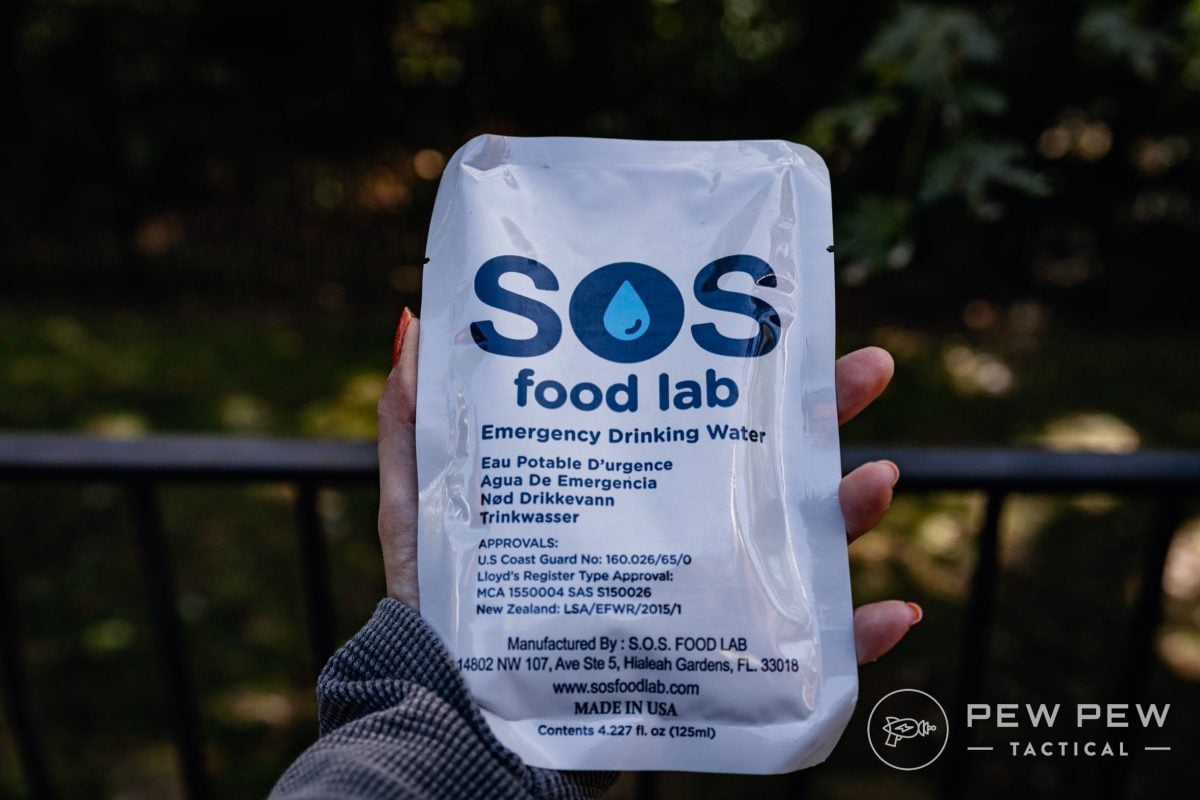
The water packets hold 4.7 fluid ounces (125 ml for all you crazy metric fans) of water each. Inside the water has a slight taste to it that I can only describe as plasticky, but it’s mild. In a pinch, I’m not going to complain about a slight aftertaste. The personal water filter is a nice touch in case the packets run out or you’re in a situation where you need a lighter load and know where to go for water.
I will say the water packets do add significant weight to the bag. If you’re on the smaller side, like me, it feels heavy pretty fast and definitely slows you down.
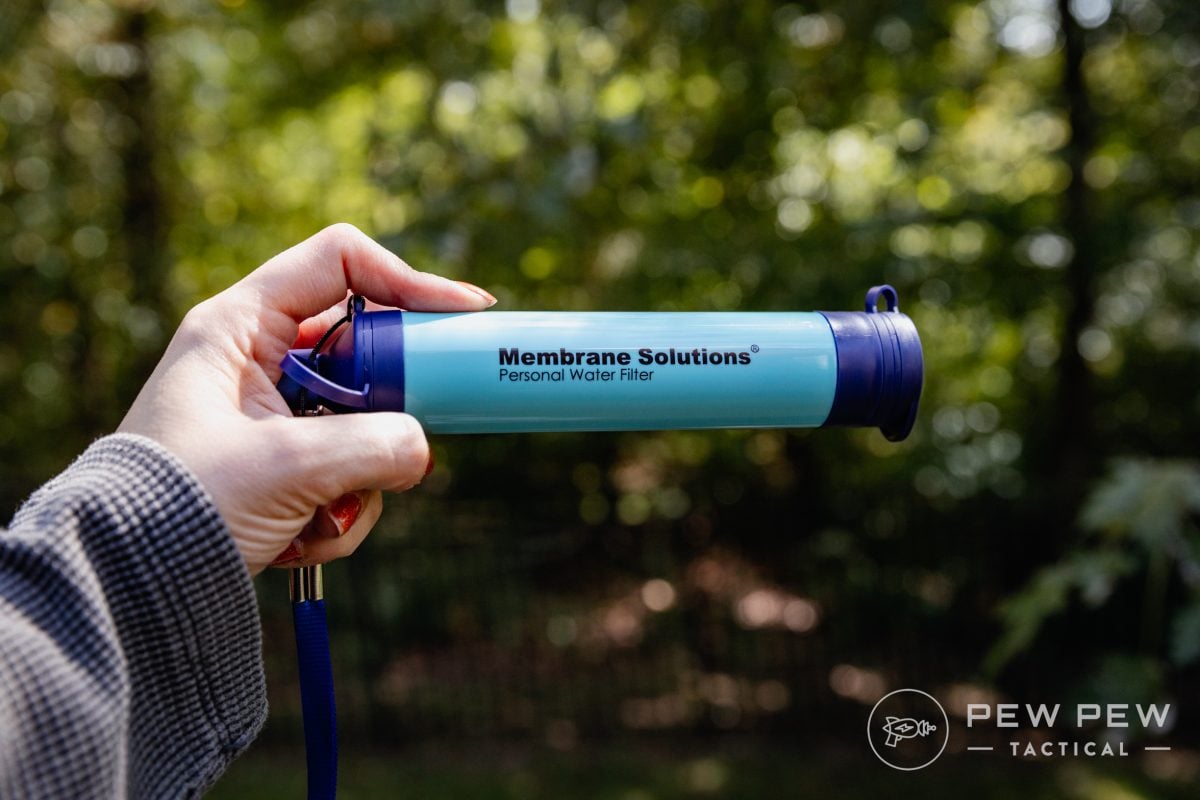
I happen to live in an area with a lot of water sources, so I might cut back on the water packets and, instead, rely more on the water filter if I’m bugging out with the SRVL1. If I’m bugging in with the SRVL2, the packets cut down on space that water jugs would take up.
Tools & Communication
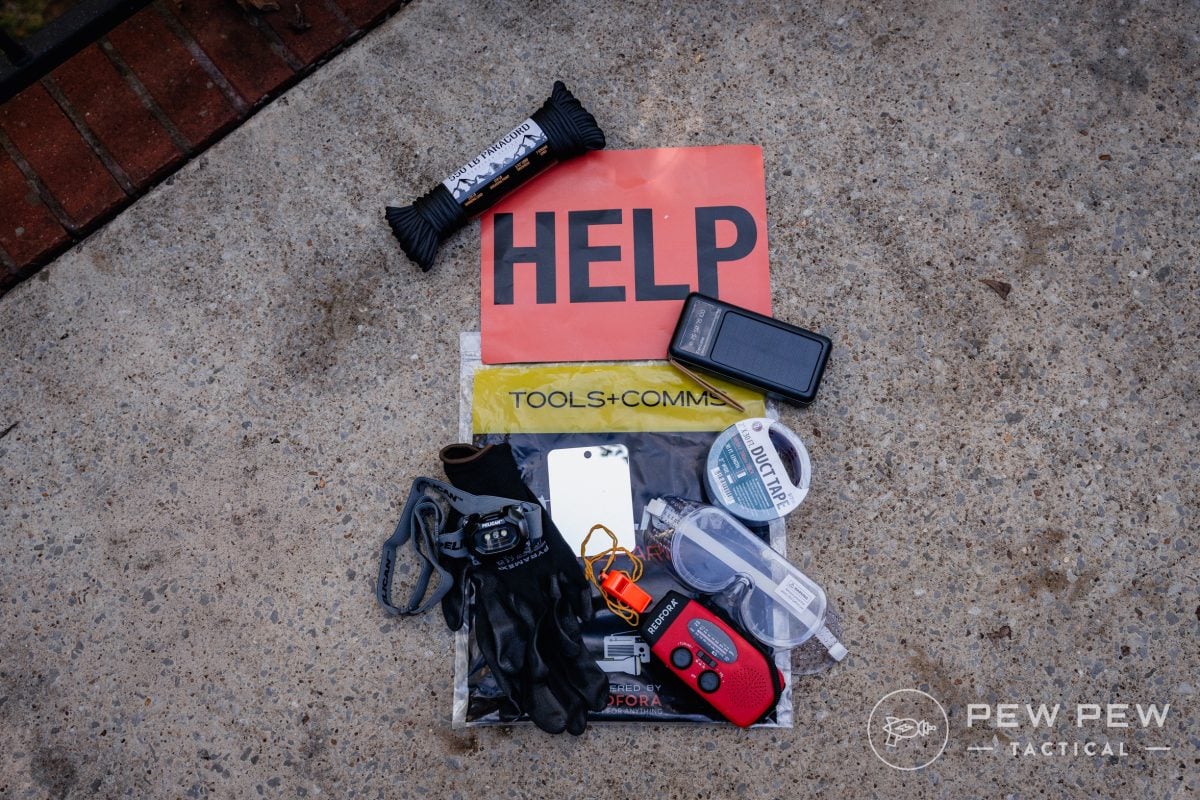
This pouch contains quite a few items that I’m not sure average people would think to include, but are definitely must-haves!
Basics like work gloves, safety googles, paracord, and duct tape aren’t items you’d likely gravitate to when building a bag, but they definitely make life easier if you’re in a survival situation. Paracord is super versatile and can be used for not only securing items but also making traps and a whole lot of other things. Gloves and googles are also great protective items to have on hand.
Also included in the kit is a solar power bank that can charge a variety of devices, including a laptop and phone. Rounding out the emergency tools are a whistle, a signal mirror, signage, and an emergency radio. The radio is small and portable and does not require batteries (hand crank gets it going). It also features a flashlight and access to AM/FM/NOAA radio.
Shelter & Hygiene
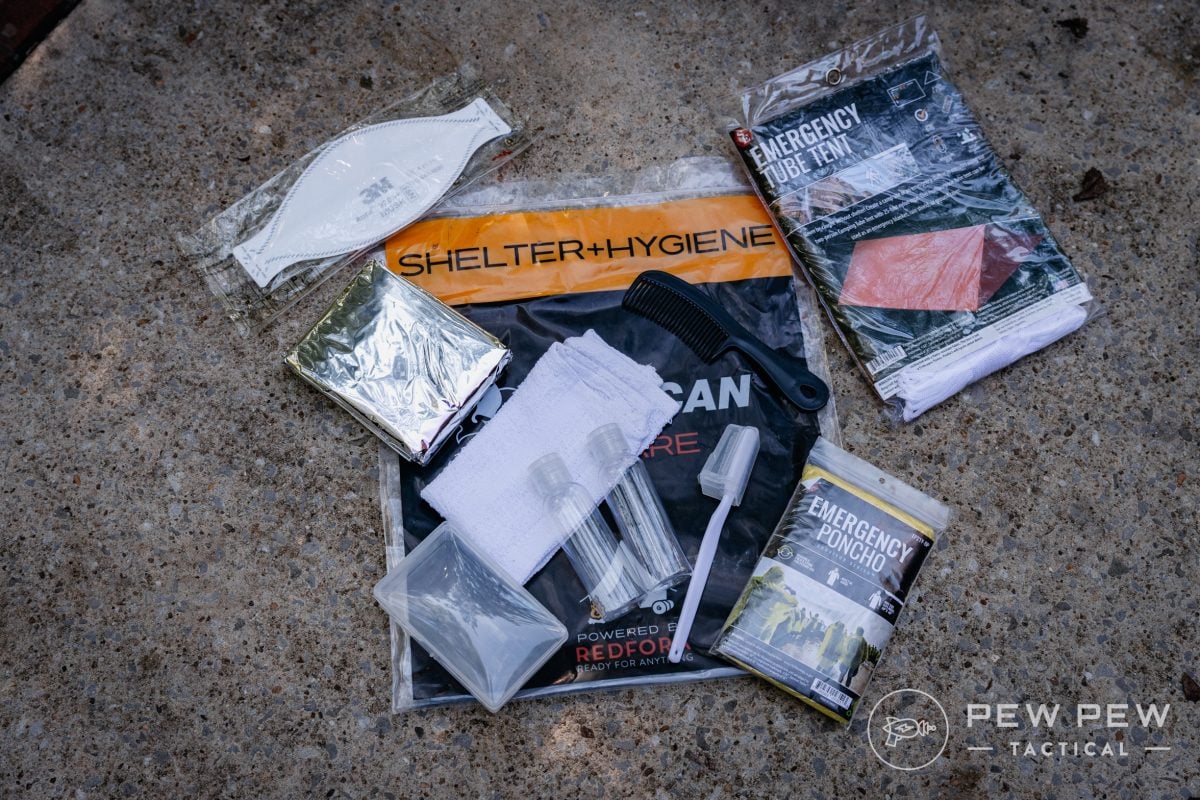
The Shelter & Hygiene pouch is stocked with items that make survival a little more comfortable. In it you’ll find containers for bar soap and shampoo/conditioner. There’s also a toothbrush with a cap, a washcloth, and a comb. Rounding out the hygiene items are some N95 Debris Masks.
On the shelter side, Pelican provides a poncho, a mylar sleeping bag, and a tube tent. Will these be the comfiest options? No, but they will get the job done and take the least amount of space in the bag.
Additional Items
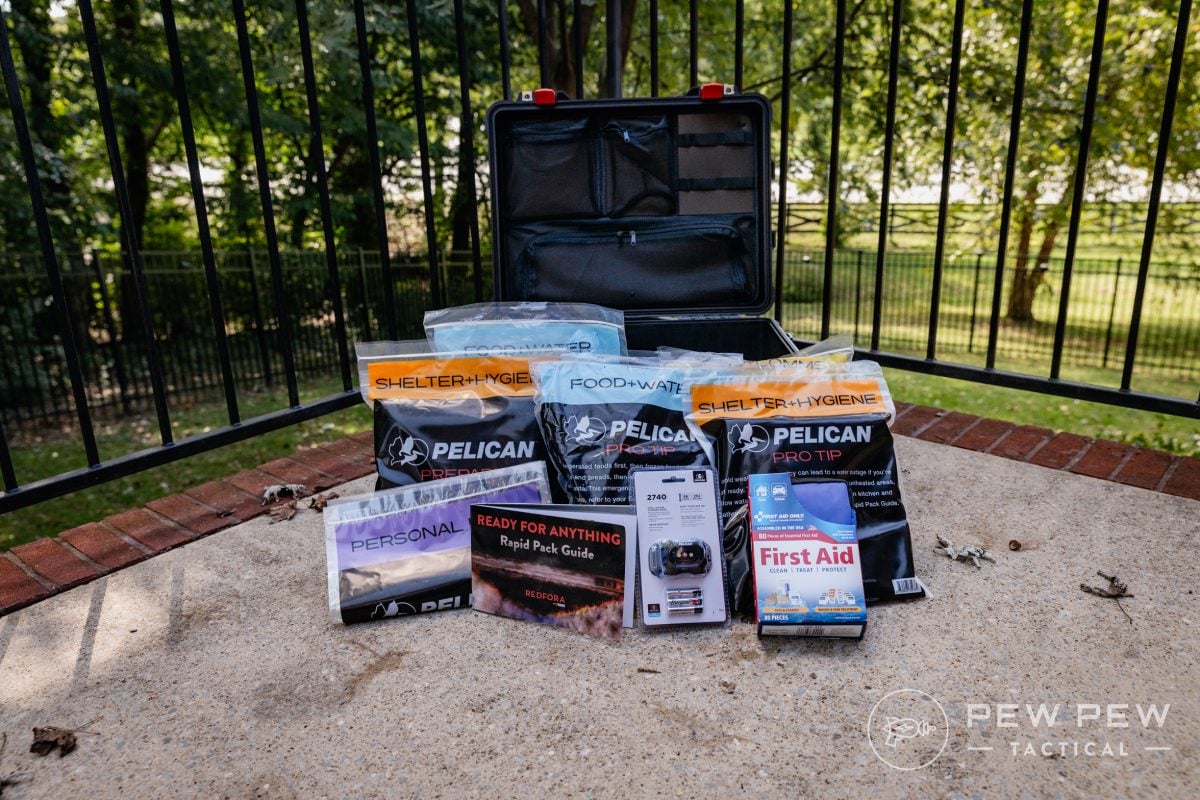
There’s an empty pouch labeled “Personal Items.” This is where you can secure important documents, medications, prescriptions, jewelry, or anything else that you want to make sure is safe with you when you bug out.
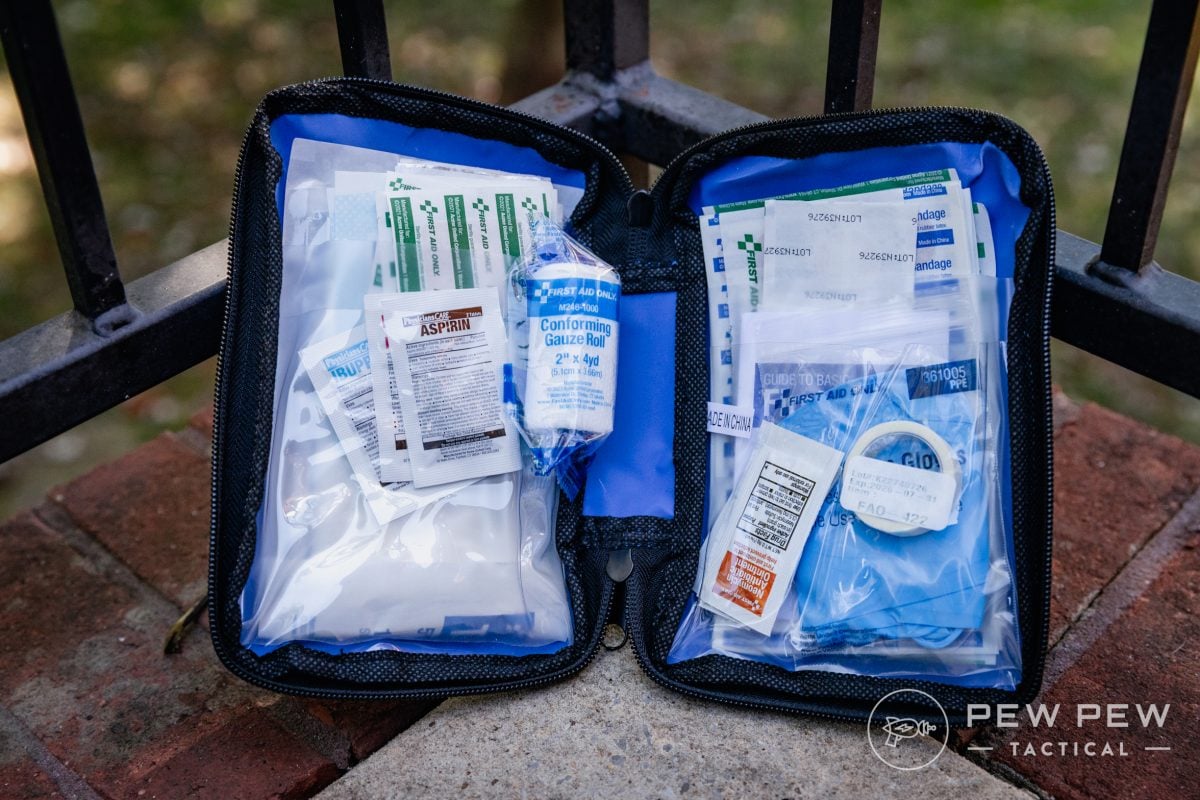
A first aid kit is also included in the bag with essentials to deal with minor injuries.
Rounding out the add-ons is a Pelican 2740 headlamp. I find this to be a nice touch – especially if you’ve ever had to make camp in the dark. (Trust me, a flashlight between the teeth while you’re setting up a tent in the pouring rain at 8 pm is not fun.)
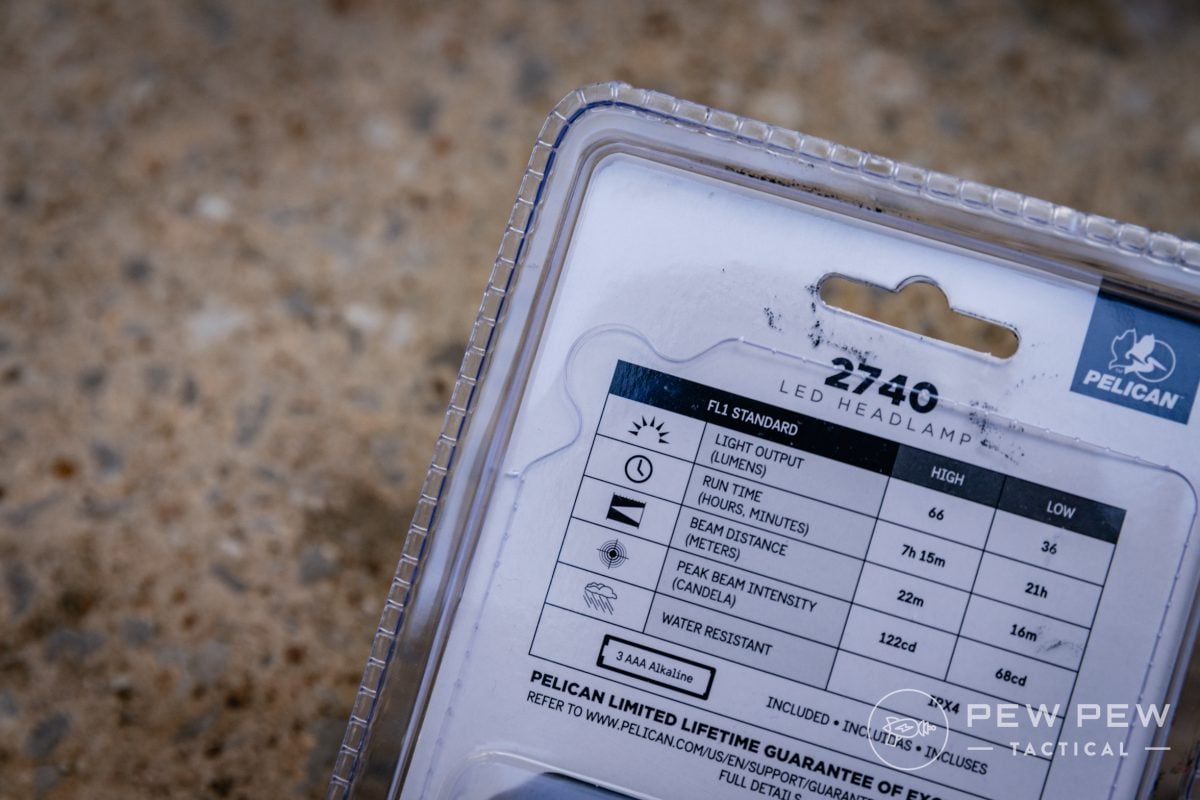
The headlamp offers 66 lumens with three LED options (two white, one red). It’s also night vision friendly, if that matters. Runtime is approximately 21 hours, and batteries are included in the packaging. Even more critical…the packaging is very easy to get into – no scissors needed.
There’s also a handy print-out checklist that you can write in other items to bring with you, and a booklet broken into sections that allows you to account for small children and pets.
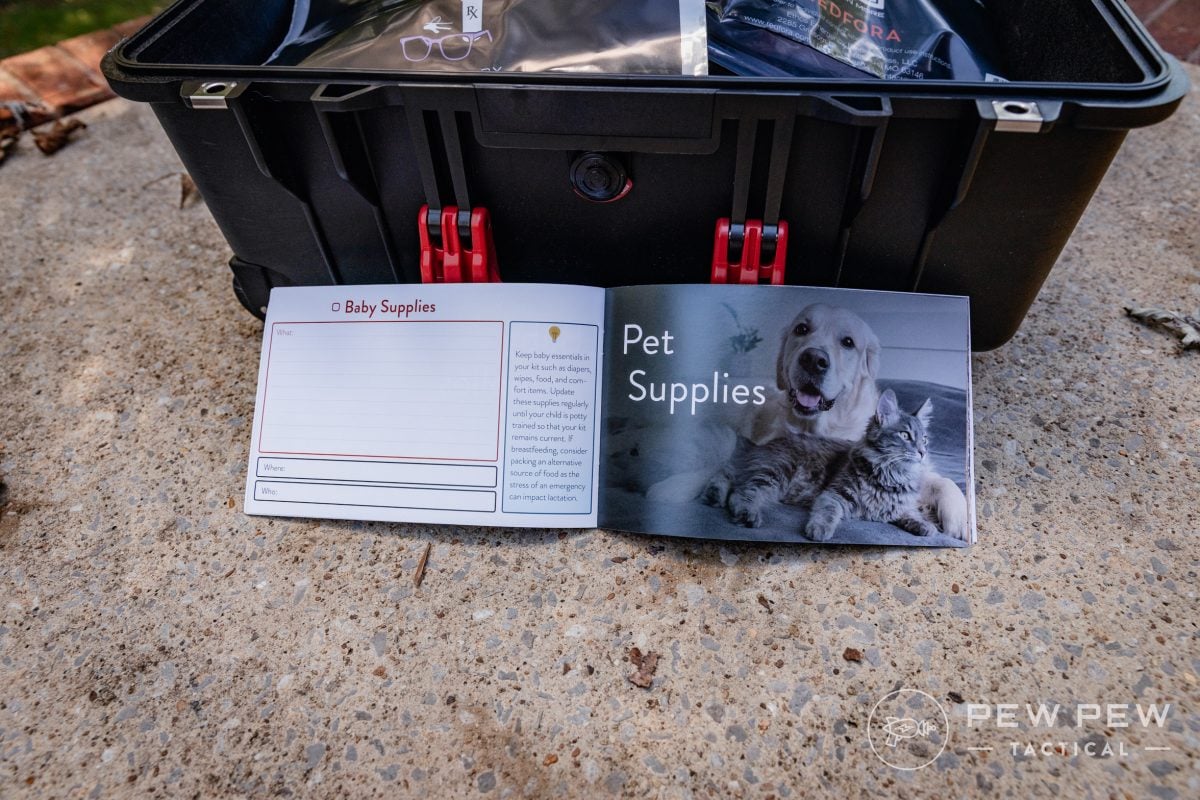
SRVL1 & SRVL2: Which One Is Right for Me?
Both the SRVL1 & SRVL2 feature the same components – the only difference is in how much you get. The SRVL1 is designed as a 1-person 72-hour kit, while the SRVL2 is a 2-person version.
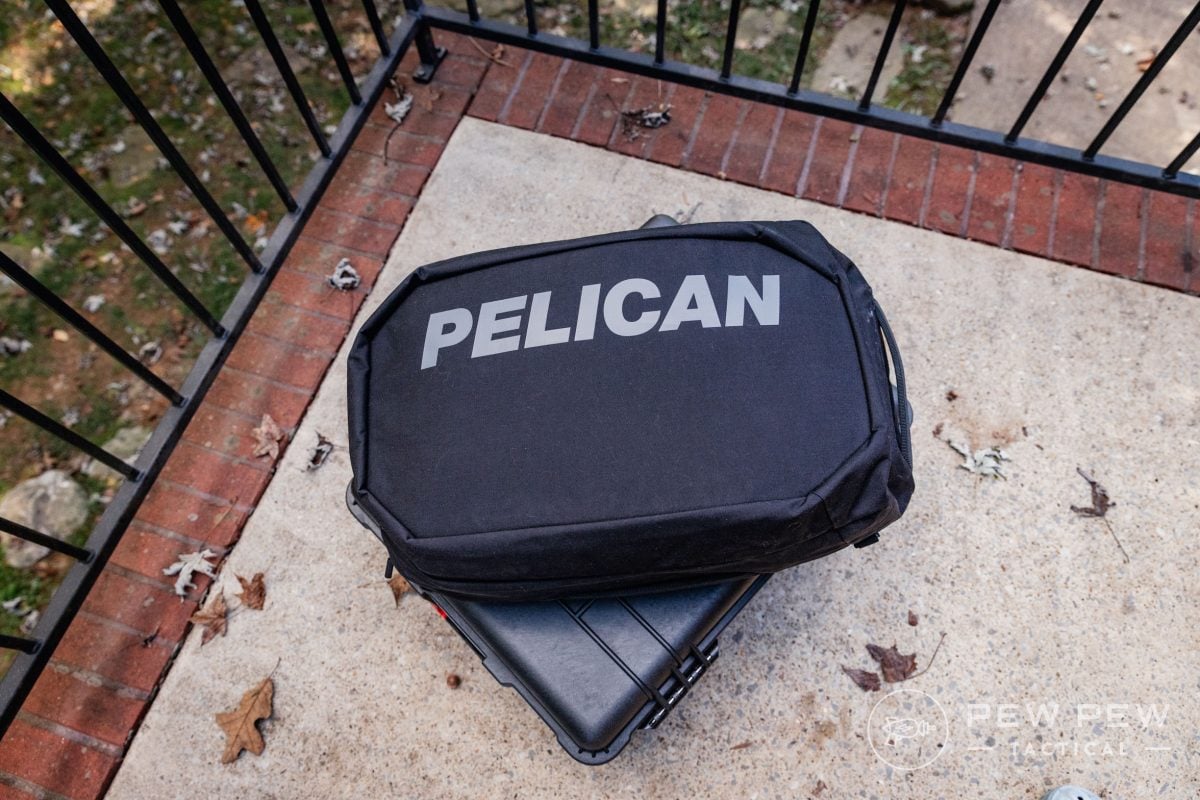
Pelican’s SRVL1 comes in a convenient bag setup, while the SRVL2 is packed in a hard-sided Pelican case. The SRVL2 comes with wheels and also features two locations to attach a lock.
Want something that is a little lighter and easier to hit the streets with? I suggest the backpack SRVL1. It would also make a great addition to the trunk of your car; keep it in there for emergencies that happen away from home.
But, if you are planning on having more people accompany you or want something to stick in a storm shelter, then the SRVL2 is the way to go. It’s a little too big to keep in your car, but it would be perfect for a shelter-in-place kind of setup.
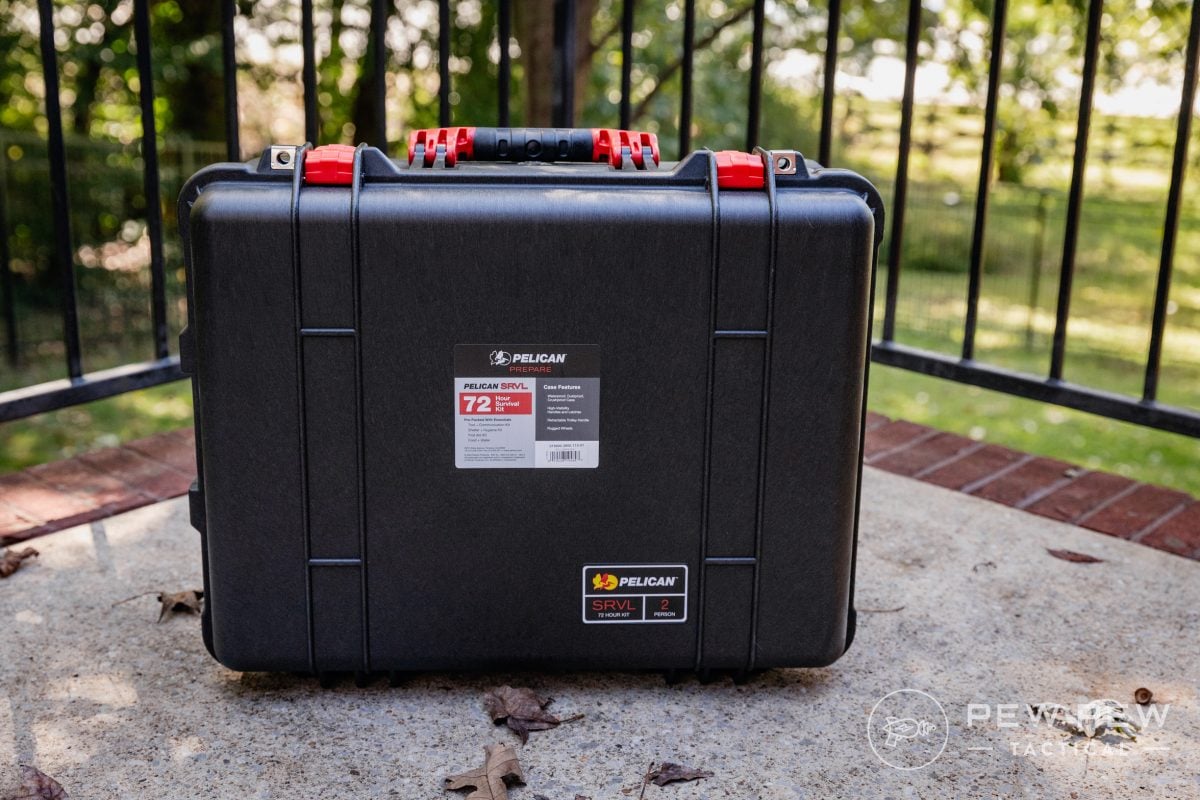
Improvements We’d Like to See
While I feel the Pelican bags are a great entry point for those who want to feel prepared but don’t have the time, energy, or knowledge to DIY, there are some areas I think they could improve on.
I get it, not every state is knife-friendly, which is why they likely left out a tactical or survival knife, but I feel this is a severe oversight. I can’t think of a single situation where a knife wouldn’t be beneficial. Pelican provides paracord, but nothing to cut it with. (A pair of scissors would be better than nothing.)
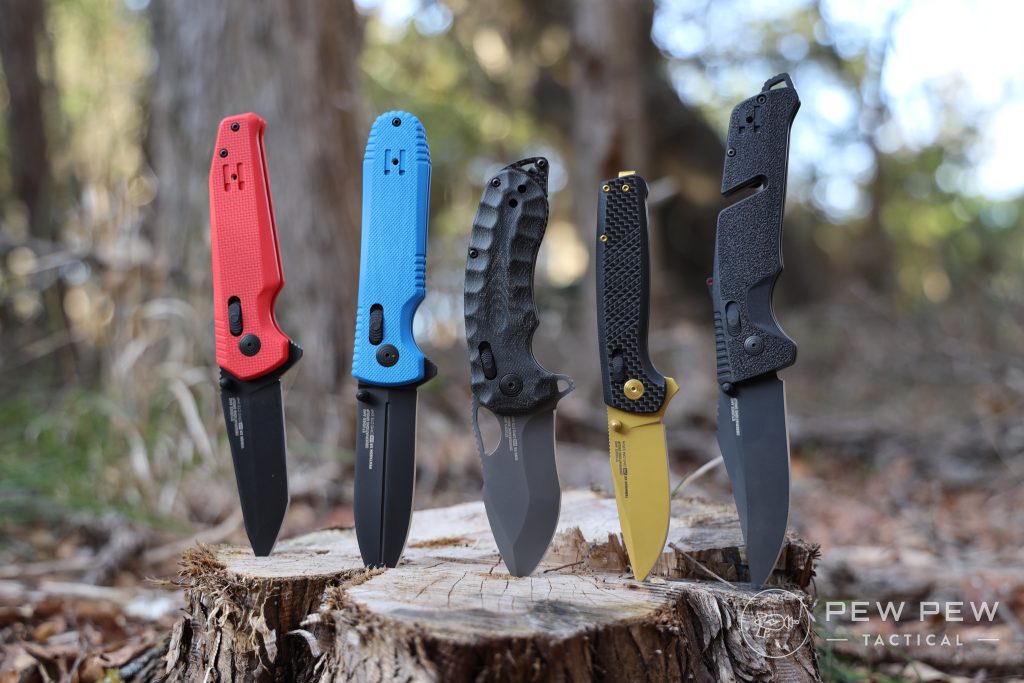
To really elevate these go bags, I would love to see Pelican include a knife or even a multi-tool.
Next, the SRVL1…Pelican, I beg of you, give me a dedicated backpack. I understand modularity is all the rage, but it doesn’t make sense in this context. The bag comes with backpack straps tucked into a zippered pocket at the top. It’s very easy to overlook and miss – in fact, I spent a good five minutes wondering why this thing that looks like a backpack has no backpack straps. After some investigating, I found the compartment and unveiled the straps.
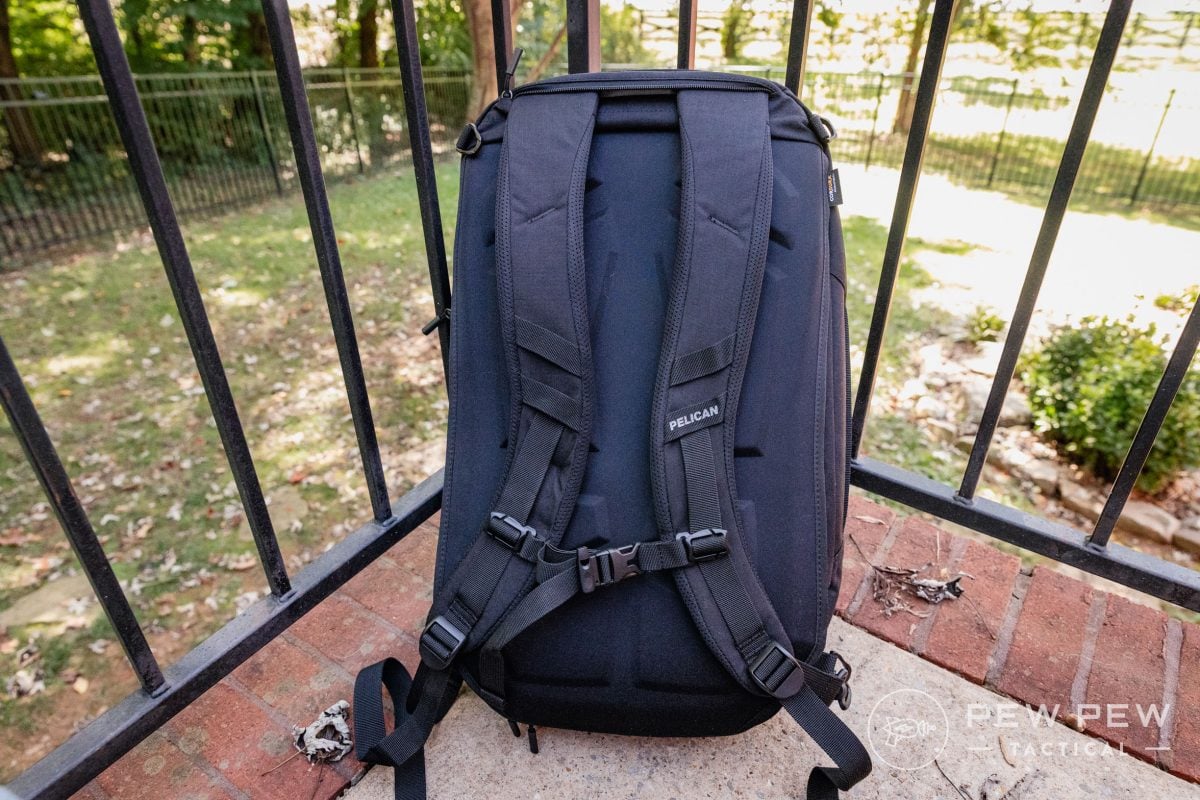
The single strap that can convert the bag into a sling style or one-shoulder carry is in the bag, so naturally, you’d think this is all you have to work with. This style of carry is bulky and awkward for a bag that weighs anywhere from 15 to 18 pounds. I don’t think you’d make it far in this configuration. As one of our other editors said when I sent a picture to our group chat…“Pro: You always have a fresh shoulder. Con: You also have Scoliosis.”
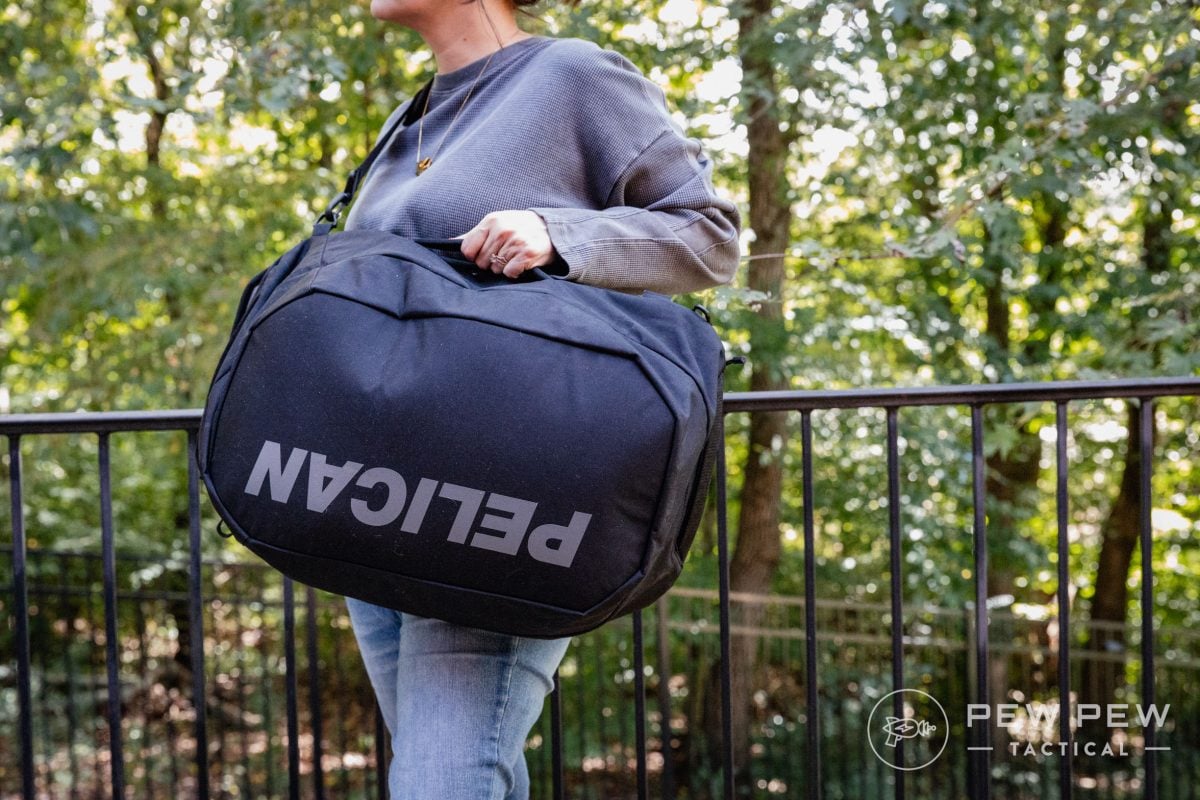
Not to mention, the connecting points for the straps are made of plastic that feels flimsy, and I fear will break with extensive use.
I know you wanted to give us versatility, but we don’t want it. Just give me a functional, sturdy backpack that I’m not going to worry about hand-carrying when the connectors break. You’ve got something good going here, and I think it would be even better with a good backpack.
By the Numbers
Ergonomics: 3.5/5
I took off points for the SRVL1’s modular design. I don’t think it makes sense and doesn’t add value to the SRVL1.
Ease of Use: 4/5
I love the organization, I love the clearly labeled pouches, and I love that this is easy to use. It truly is beginner-friendly.
Customization: 5/5
Take away from the bags, add to the bags, there’s no stopping you.
Value: 4/5
The price is steep, but I think the value of these go bags is two-fold. One, you get the Pelican bags, which are pretty sturdy and roomy. Two, you get a pre-stocked kit that you don’t have to fool with putting together yourself.
Overall: 4/5
Prices accurate at time of writing
Prices accurate at time of writing
-
25% off all OAKLEY products - OAKLEY25
Copied! Visit Merchant
Prices accurate at time of writing
Prices accurate at time of writing
-
25% off all OAKLEY products - OAKLEY25
Copied! Visit Merchant
FAQs
How long does the food and water last?
Both the food and water have a shelf life of five years, and expiration dates are clearly marked on the packets. Once they expire, you can order refill packets from Redfora.
What kind of situations will this kit work with?
According to Pelican, these kits are perfect for earthquakes, wildfires, hurricanes, blackouts, and evacuations. I personally put the SRLV2 in the “tornado closet” in my house, where my family hunkers down during tornado season.
What other items should I add to these kits?
At a minimum, I would add a survival or tactical knife, multi-tool, and gas mask to really round out these kits. Personal items like passports, birth certificates, adoption papers, marriage licenses, pet vaccination records, medical records, and prescriptions would also be advised. (I also suggest photos of pets and children in case you get separated. That makes it easier for law enforcement or others to help locate them.)
Which kit is best for my car?
The SRVL1 is the better option for a vehicle, while the SRVL2 is best served stowed at home.
Where should I store my kit in my house?
I recommend storing it in an easy-to-access location where you can grab and go.
How We Tested the Pelican Go Bags
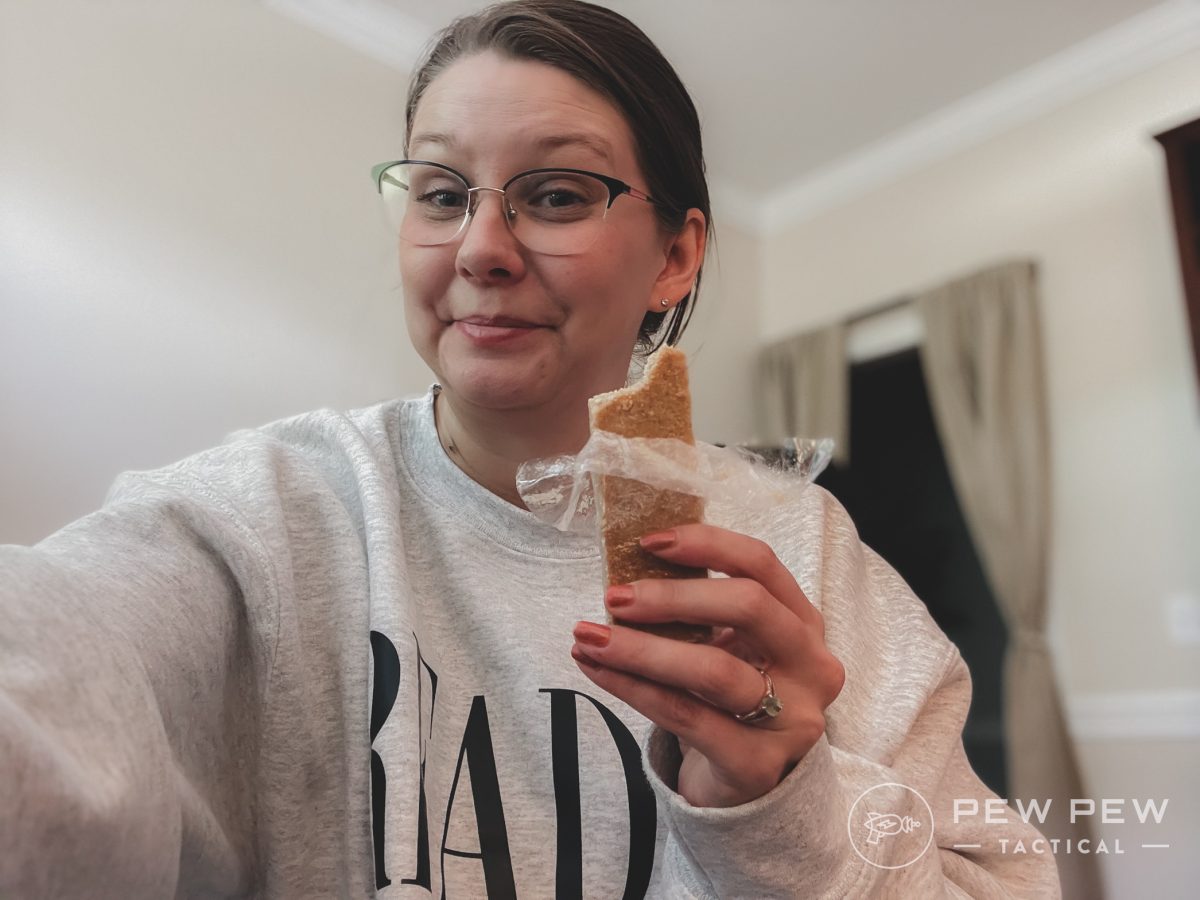
Pelican sent me the SRVL1 and SRVL2 for this review. To evaluate the contents, I dumped everything out and, one by one, tested each individual component. (Yes, I actually ate the food rations.)
After testing the items in the kit, I then evaluated the cases they came in, looking for durability, ease of use, comfort, and the ability to add items to them.
Meet the Experts
Leading this review is Editor-in-Chief Jacki Billings. She runs our experienced team of reviewers and is an American Heart Association BLS Instructor as well as a member of the Society of Professional Journalists, ACES: Society for Editing, and the Professional Outdoor Media Association. Jacki has a bachelor’s degree in journalism and has worked as a media professional for close to 20 years, specializing in gun media for almost 10 years. With 2,000+ articles to her name, she uses her professional journalism and editing experience to set testing protocols and editorial standards for Pew Pew Tactical.
Final Thoughts
If you want to be a little more prepared for emergencies, Pelican offers solid options in the SRVL1 and SRVL2.
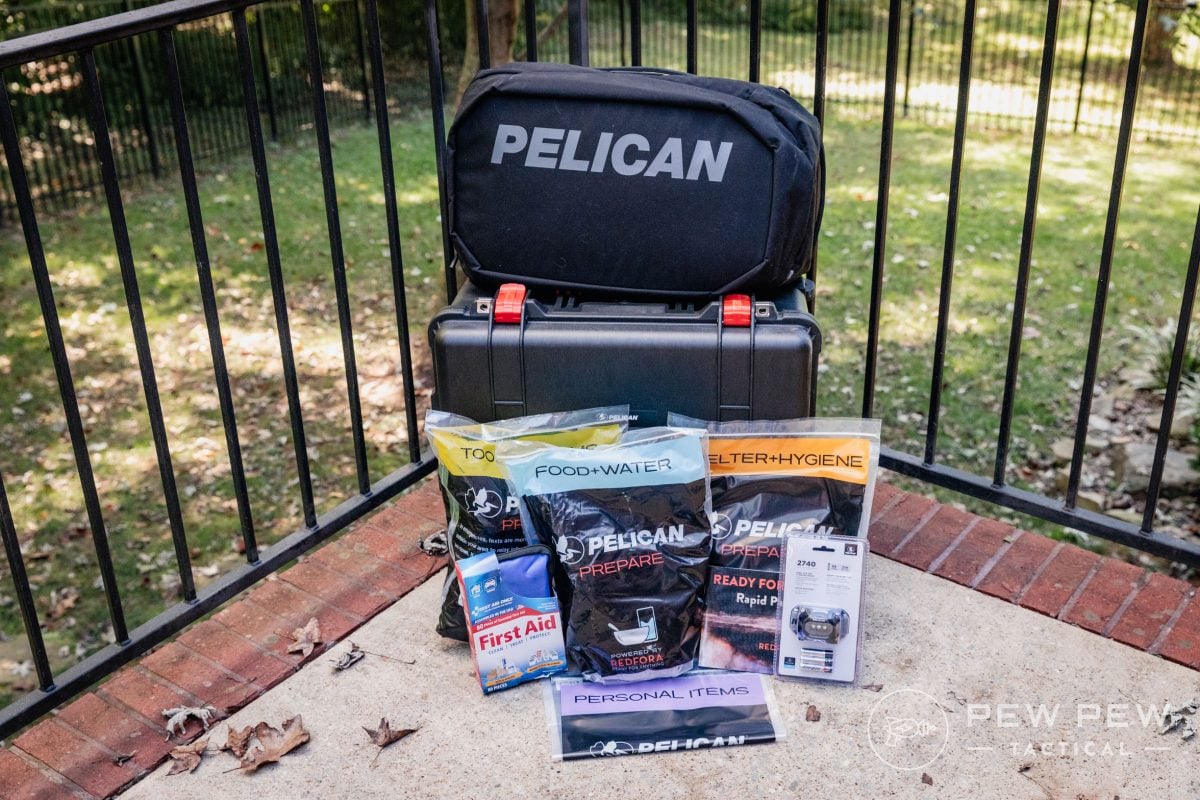
Is it the most affordable option? No. You can likely build your own kit with an existing backpack at home for a lot cheaper. What the SRV1 and SRVL2 offer over price is convenience. If you don’t want the headache of planning, sourcing, and purchasing items for a bug out bag, then a ready-to-go bag like the SRVL1 or SRVL2 is your best bet.
What do you think of Pelican jumping into prepping and survival? Let us know in the comments below! Want to build your own bugout bag? We have options galore in our Bugout Bag List: Best Gear to Survival article.

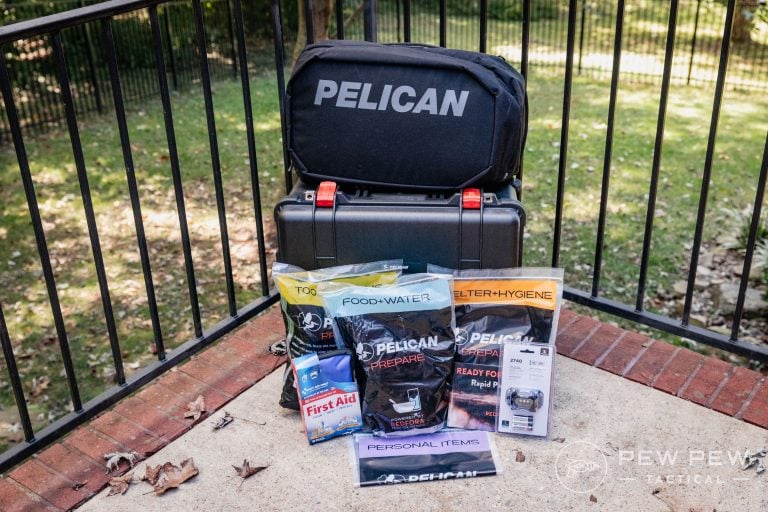






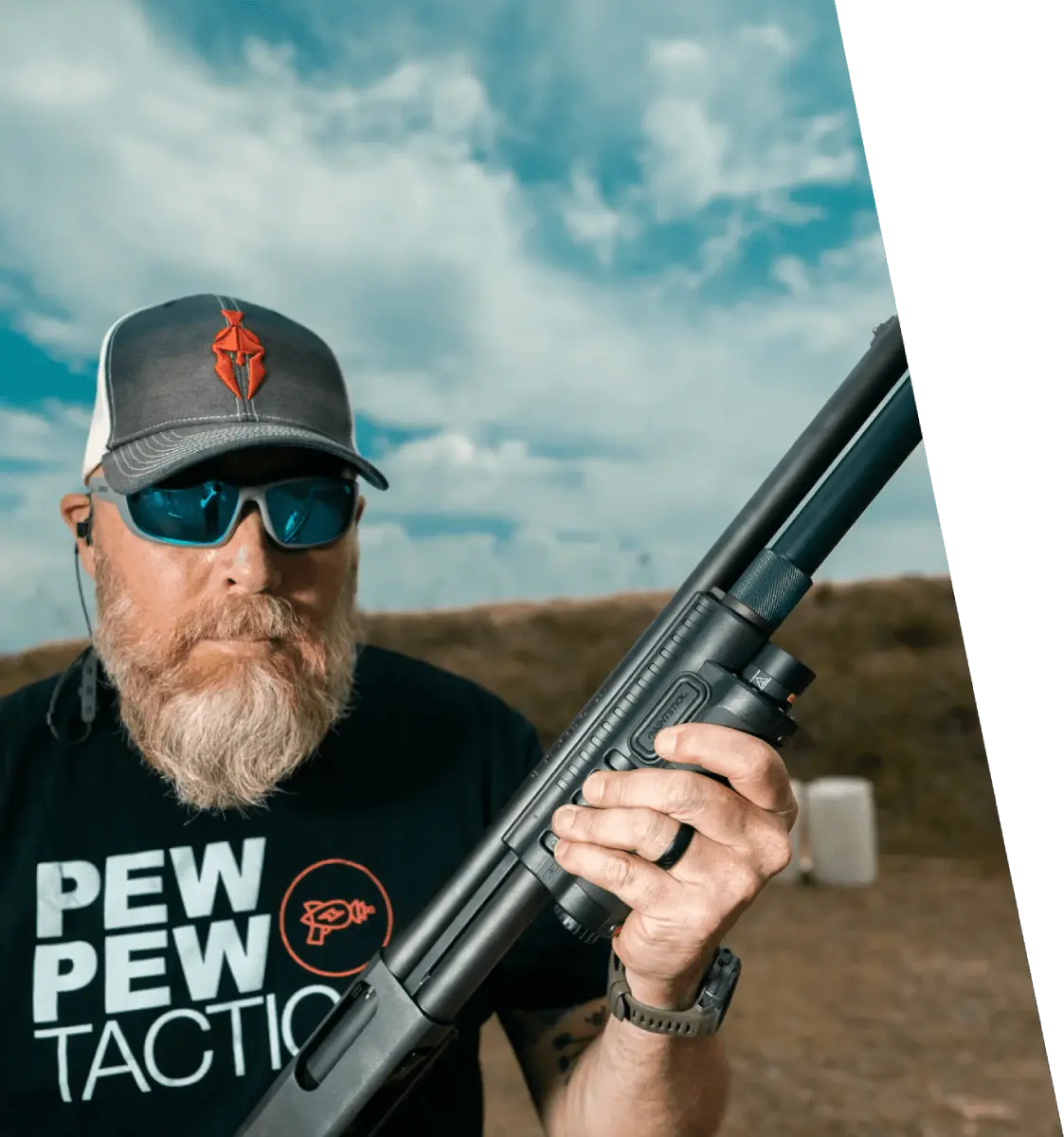

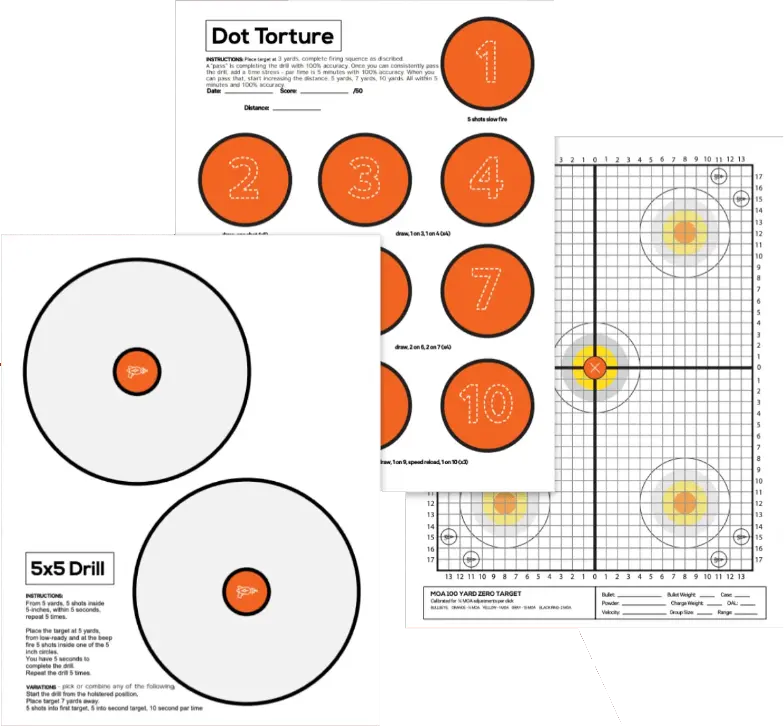
Leave a Reply